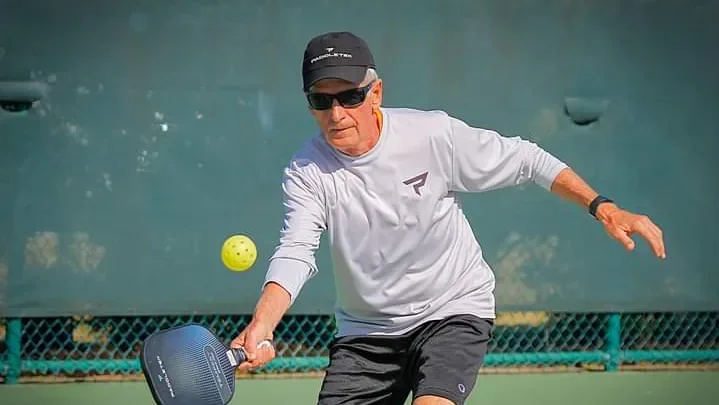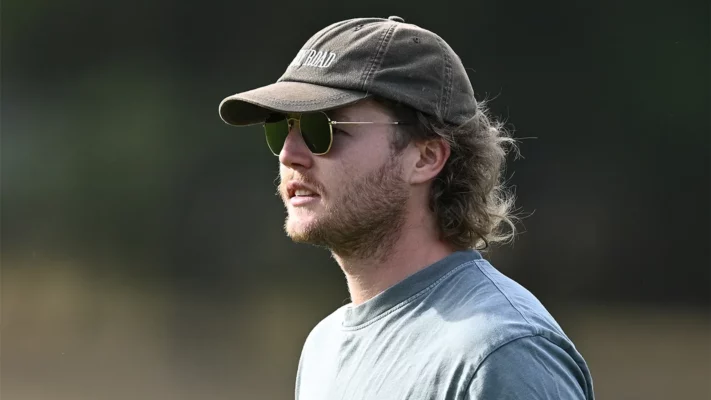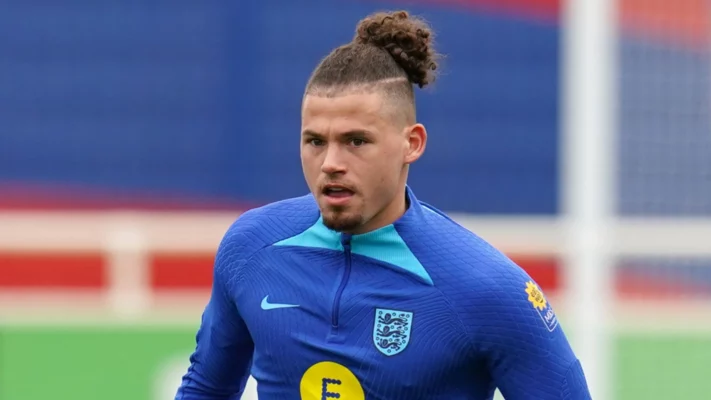
At nearly 80 years old, NBA icon Rick Barry is embracing a fresh start, diving into the world of pickleball with the same competitive spirit that defined his basketball career. As his 80th birthday nears, Barry finds himself among the youthful contenders within the senior league of a sport he’s swiftly mastering—much like his basketball heyday.
In recent years, like many in their seventies, Barry transitioned from traditional post-retirement sports, tennis and golf, to pickleball—a game once pegged for the leisurely retired. “After hanging up my NBA jersey, I sought a new competitive outlet,” Barry shared. The physical toll of tennis and the end of “old farts divisions” in long drive golf competitions led him to this juncture. Encouraged by his wife Lynn, a notable college basketball player herself, Barry embarked on his pickleball journey, marking a new chapter in his storied athletic legacy.
Discovering Pickleball: Barry’s Unexpected Journey
“Have you ever thought about trying pickleball?” she suggested, a hint of amusement in her voice as Barry reminisced about their conversation. His response was lighthearted yet perplexed, “Pickleball? What in the world is that?”
To Barry, a legend who had transformed the underhand free throw into an iconic technique over his 15-year basketball career, which included stints in two leagues and securing an NBA championship, pickleball seemed like an alien concept. Far more alien, indeed, than the traditional methods of shooting he had mastered.
However, standing tall at 6 feet 7 inches, Barry’s extensive reach and his skills derived from tennis meant he was well-equipped to adapt to pickleball—a sport with an amusing name and distinctive rules. Despite his physical advantages, Barry initially found difficulty with the game’s critical technique: the dink shot. This technique involves hitting the ball off the bounce within “the kitchen,” a specific area near the net where air shots are prohibited. This part of the game quickly became his biggest challenge, yet ultimately served as a crucial learning curve.
Barry shared, “At first, I despised the kitchen. It took me a while to understand that mastering the kitchen is essential for playing pickleball at a competitive level.”
Embracing the challenge, Barry would make frequent journeys from his winter residence in Bradenton, Florida, to The Villages. This retirement community, known for its pickleball enthusiasm, boasts 200 dedicated courts and hosts a large community of players, many of whom have gained national recognition. Barry’s journey into pickleball highlights an unexpected chapter in his storied athletic career, showcasing his adaptability and willingness to explore new horizons.
Barry’s Quest for Excellence in Tennis
Barry emphasized the importance of challenging oneself by playing with skilled individuals to enhance one’s abilities. He articulated his ambition to reach a level of proficiency that would allow him to contend for a national championship. Achieving this goal, Barry has triumphed in the men’s doubles category at the previous US Open in Naples and secured a victory at the Huntsman World Senior Games in St. George’s, Utah. Moreover, he has earned medals in mixed doubles across various national, regional, and local competitions.
With three years of competitive tournament experience under his belt, Barry boasts a commendable record of 99 wins to 45 losses. As he prepares for the upcoming US Open in April, Barry is set to compete in the singles category for the first time. His aspiration is to attain a triple crown victory, an ambitious feat entailing three gold medals in a single tournament.
Navigating Competitive Longevity: Challenges and Triumphs in Senior Sports Divisions
Barry faces a significant hurdle in reaching his newest ambition due to a dwindling pool of competitors within his age group. The division for athletes over 80 sees fewer participants since it demands engaging in numerous matches, possibly up to six or seven, within a mere 10-hour window to achieve a medal.
Carl Foster, an emblem in marshalling competitions across the country and principal and joint possessor of a professional squad in Florida, underscores the conundrum. ‘The aspiration to vie in the venerable leagues is present, yet the exacting essence of contests discourages numerous elders. It’s onerous and necessitates being in peak bodily form,’ Foster elucidates.
However, Barry isn’t alone in his pursuit of athletic achievement at an advanced age. As the second athlete with a legacy in both the NBA and ABA to be inducted into the Naismith Basketball Hall of Fame, he joins a prestigious list of former and present professional athletes who have taken up pickleball.
Ivan Lendl, a tennis legend and Hall of Famer at 63, has recently clinched victories in two consecutive tournaments within the 5.0 men’s pro doubles category—the highest non-professional level—for the 50-plus and 60-plus age groups.
Moreover, Carling Bassett-Seguso, once a top-8 WTA player in 1985 before her career was sidelined by injuries and a prolonged battle with depression, has become a regular on the Delray Beach pickleball courts, playing alongside her children. At 56, her involvement underscores the growing appeal of pickleball across different generations of professional athletes.
The Healing Game: Pickleball’s Impact on Recovery and Connection
Two years ago, Bassett-Seguso embarked on a journey with pickleball, only to face a challenging setback seven months later when she sustained ACL and MCL injuries during a tournament. These were not her first encounters with severe injuries; her post-tennis life, filled with a decade of horse riding, brought about a broken hip, a shattered pelvis, and multiple concussions. Despite the physical toll, Bassett-Seguso’s spirit remained unbroken. During a pause in recreational play in Delray Beach, she reflected on her journey through physical and mental trials, including her fight against clinical depression treated partially with psilocybin mushrooms. Yet, it was pickleball that emerged as her most potent remedy.
Embracing the joy and communal spirit of pickleball, she found not only a passion for life but also a supportive community of friends ready to stand by her side. Her story is a testament to the sport’s unique power to heal and unite. Similarly, former tennis stars Jack Sock and Genie Bouchard have found a new competitive arena in professional pickleball, signaling a broader trend of athletes discovering solace and opportunity within the sport.
Shifting Dynamics in Professional Tennis and Pickleball
In a remarkable debut performance last May, a 31-year-old named Sock secured a triumph in mixed doubles alongside the paramount female contender, the youthful Anna Leigh Waters. In contrast, Bouchard, who had ascended to the Wimbledon zenith at 19 back in 2014, encountered an arduous commencement in January, departing posthaste in the nascent stages of doubles, mixed doubles, and singles. This narrative has kindled an expansive discourse regarding the metamorphosis from lawn tennis to pickleball, accentuated by annotations from Foster, the curator of a Floridian symposium erstwhile conquered by Lendl. Foster elucidates the fallacy that adept racket wielders can effortlessly reign supreme in pickleball, annotating the flux of juveniles, erstwhile unheralded in tennis, transitioning to pickleball at a premature epoch in their vocations. This drift accentuates a pivotal evolution within pickleball itself, as the activity progressively magnetizes a juvenile demographic, positing a conundrum for venerable competitors across all echelons.
Rising Stars of Pickleball: The Phenomenal Journey of Ben Johns and Anna Leigh Waters
Ben Johns and Anna Leigh Waters have emerged as exceptional talents in the world of pickleball. Hailing from Maryland, 23-year-old Johns has secured his position as the leading male player. Meanwhile, Waters, originating from Florida and having celebrated her 17th birthday in February, has dominated the women’s circuit for several years, consistently holding the No. 1 spot.
Waters’ journey began at the tender age of 12, winning her first tournament alongside her mother, Leigh, who herself was a seasoned college tennis player. The duo of Johns and Waters has proven to be formidable, recently clinching their 30th mixed doubles title, showcasing their prowess in a sport that has seen a surge in popularity in their home states during the pandemic era.
The sport’s evolving demographics have led experts like Foster to argue that Waters’ early achievements may remain unparalleled. “The landscape is changing,” Foster remarked. “The days of witnessing a 12-year-old dominate the scene as Waters did are likely behind us.” This evolution reflects a broader trend of increasing competitiveness, with new athletes bringing diverse skills from various backgrounds, all finding a common ground in pickleball. The sport’s accessibility and the rapid rate at which newcomers can reach competitive levels are significant factors in its growing appeal. Ultimately, an athlete’s progress hinges on their ability to master the nuances of the game.
Legends of Sports Invest and Compete
Prominent sports figures are playing a significant role in elevating pickleball’s profile by acquiring stakes in major professional pickleball teams and participating in high-profile televised events. Icons like LeBron James and Tom Brady are investing in the sport, while tennis legends John McEnroe and Andre Agassi have showcased their skills in the Pickleball Ball Slam I and II, broadcasted events designed to draw attention to the sport.
In a notable matchup at the ESPN-aired event held at the Hard Rock Hotel and Casino near Fort Lauderdale, McEnroe teamed up with Maria Sharapova to face Agassi and Steffi Graf. This high-profile game was the highlight of the evening, drawing fans and spectators to the venue.
Reflecting on his participation, Agassi remarked following his mixed doubles victory with Graf, “Our aim is to contribute to the sport’s growth. Pickleball is inherently a social and inclusive activity, fostering community through its fun and engaging nature. It offers a variety of competitive matchups, making it accessible to a wide audience.”
Despite the entertainment-focused nature of Pickleball Slam and the varying levels of match quality, the involvement of celebrated athletes introduces an element of prestige to the sport. According to Foster, “Incorporating celebrities into emerging sports lends them legitimacy. While many current athletes engage with pickleball for leisure or fitness rather than competition, their serious approach to the game underscores its appeal and potential for growth.”
From Tennis Courts to Pickleball Glory: The Transition of Seasoned Athletes
Steve Rose, once an aficionado of multiple racket sports, found a new passion in pickleball eight years ago. His successful partnership with Ivan Lendl in a 60-and-over professional pickleball event has highlighted the ease with which tennis players can transition to and excel in pickleball. Rose observed that initially, tennis enthusiasts hesitated to switch to pickleball. However, the involvement of renowned tennis players like Ivan Lendl and Jack Sock has not only elevated the game’s standard but also its popularity, bringing it to a wider audience with their notable participation.
Ivan Lendl, on his part, views his contribution to pickleball’s growing appeal not as a deliberate effort to promote the sport but as a pursuit of personal enjoyment and camaraderie. Following a thrilling gold medal win with Rose, Lendl shared his perspective, emphasizing that his enjoyment of the game, whether played in a formal setting or casually in the backyard, remains paramount. This attitude mirrors his approach to tennis, where the joy of playing well was his greatest reward.
Lendl’s foray into pickleball at the Boca Masters was motivated by the event’s proximity to his new residence in Vero Beach, rather than a calculated move to expand his trophy collection. This transition occurred over four decades after his first ATP tournament victory in Houston at the tender age of 20, a precursor to an illustrious career that would see him claim 94 titles, including eight Grand Slams. Recollecting his pickleball debut, Lendl expressed a special fondness for Boca, marking it as the venue of his first pickleball title. This sentiment is echoed by Foster, who is eager to have Lendl join his professional team, hoping to capitalize on the tennis legend’s influence and skill in the rapidly growing sport of pickleball.
Competitive Spirit Lives On in Retired Athletes Through Pickleball
Despite not being deeply invested in the game himself, John McEnroe acknowledges pickleball as an excellent competitive outlet for retired athletes. He amusingly notes that individuals like Rick Barry take competitions seriously, even in activities as casual as giving autographs.
Jalen Rose, having observed Barry in action, highlights how pickleball offers former professional athletes a chance to reignite their competitive flame. Rick Barry, a decorated basketball player known for his accomplishments in both the NBA and ABA, finds a new arena in pickleball. Away from the limelight of his basketball days, Barry competes with a mix of anonymity and recognition, driven by the same competitiveness that characterized his sports career.
Despite the challenge of finding peers of his age to compete against, Barry remains undeterred, relishing the competition even against much younger opponents. His participation in pickleball tournaments, even against players half his age, underscores his enduring love for competition. For Barry, the sport is not just a social activity but an extension of his athletic drive to win.







